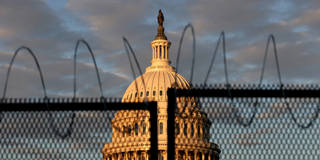In the year since a mob of former President Donald Trump's supporters ransacked the US Capitol, America's political divisions have only grown deeper. Democrats and Republicans alike must recognize that without measures to shore up democracy at home, the country's international standing and security will continue to erode.
WASHINGTON, DC – The anniversary of the January 6, 2021, attack on the US Capitol has come and gone, and many Americans are deeply depressed that the country’s political divide has only deepened. Though most Republican Party leaders condemned the attack at the time, the GOP has since internalized former President Donald Trump’s web of lies and falsehoods about the 2020 election, which he lost by seven million votes. Republicans have largely refused even to participate in the congressional investigation into the matter.
A year after a sitting president tried to overturn the results of a fair and lawful election, the effort to identify and prosecute those responsible now must compete for attention with other security crises: Russian troops massing near Ukraine; Iran nearing the threshold of nuclear breakout; and humanitarian catastrophes in Afghanistan and Yemen. Faced with all this, American leaders will be tempted to draw a bright line between home and abroad. But doing so would be both risky and wrong.
America’s profound polarization reflects a society whose members no longer share a core understanding of what it means to be “secure.” Americans tend to have widely divergent experiences – across racial, religious, and gender lines – with US domestic security institutions. Trust in the US military and security forces used to be consistently high; now, it is falling, alongside trust in the rest of America’s government institutions. Americans no longer agree about who or what constitutes a threat, with Democrats much more likely to cite internal cohesion and political violence, and Republicans more concerned with traditional nation-state foes. Moreover, Americans are divided by ideology and age over whether people and ideas from elsewhere are an opportunity or a threat.

WASHINGTON, DC – The anniversary of the January 6, 2021, attack on the US Capitol has come and gone, and many Americans are deeply depressed that the country’s political divide has only deepened. Though most Republican Party leaders condemned the attack at the time, the GOP has since internalized former President Donald Trump’s web of lies and falsehoods about the 2020 election, which he lost by seven million votes. Republicans have largely refused even to participate in the congressional investigation into the matter.
A year after a sitting president tried to overturn the results of a fair and lawful election, the effort to identify and prosecute those responsible now must compete for attention with other security crises: Russian troops massing near Ukraine; Iran nearing the threshold of nuclear breakout; and humanitarian catastrophes in Afghanistan and Yemen. Faced with all this, American leaders will be tempted to draw a bright line between home and abroad. But doing so would be both risky and wrong.
America’s profound polarization reflects a society whose members no longer share a core understanding of what it means to be “secure.” Americans tend to have widely divergent experiences – across racial, religious, and gender lines – with US domestic security institutions. Trust in the US military and security forces used to be consistently high; now, it is falling, alongside trust in the rest of America’s government institutions. Americans no longer agree about who or what constitutes a threat, with Democrats much more likely to cite internal cohesion and political violence, and Republicans more concerned with traditional nation-state foes. Moreover, Americans are divided by ideology and age over whether people and ideas from elsewhere are an opportunity or a threat.